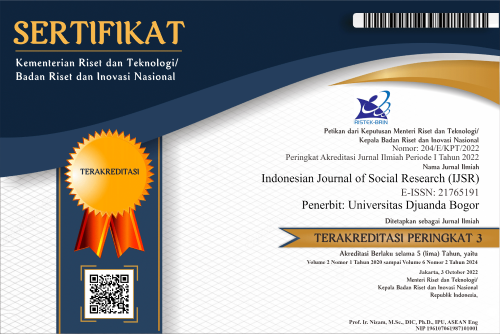Self-Esteem Matters: Examining its Impact on Academic Achievement in the Context of Gender and Age Diversity in Higher Education
Abstract
Self-esteem plays a crucial role in shaping academic achievement among university students. This study investigates how self-esteem, gender, and age influence academic performance, particularly within the Indonesian context. Despite extensive global research, there needs to be more understanding of these dynamics among Indonesian university students. The study explores the relationships between self-esteem, gender, age, and academic achievement, identifying significant predictors and differences. A quantitative survey design was employed to gather data from 309 students across 12 Central Java, Indonesia universities. Data collection was executed through online surveys distributed via WhatsApp and Facebook. Data analysis was performed using Pearson correlation and multiple regression techniques with SPSS. The findings confirm that self-esteem significantly impacts academic achievement, establishing it as a strong predictor of academic success. While gender differences in self-esteem were notable, age did not significantly affect self-esteem. Interestingly, no significant gender gaps in academic performance were observed, though academic achievement varied across age groups. These conclusions suggest that enhancing self-esteem could improve academic outcomes. This research contributes to the global understanding of self-esteem dynamics, emphasizing the need for targeted interventions in educational settings. The insights gained can inform educators and policymakers in developing strategies to support students' academic success in Indonesia.
References
Batista, M., Ramos, L., Santos, J., Serrano, J., Petrica, J., & Honório, S. (2022). Exercise Influence on Self-Concept, Self-Esteem and Academic Achievement in Middle-School Children. Revista Romaneasca Pentru Educatie Multidimensionala, 14(4 Sup.1), 369–398. https://doi.org/10.18662/rrem/14.4Sup1/678
Chamsi, F. Z., Katir, I., Korchi, A., Belbachir, S., & Ouanass, A. (2022). The impact of social media on self-esteem. European Psychiatry, 65(S1), S551–S551. https://doi.org/10.1192/j.eurpsy.2022.1410
Christy, X. I., & Mythili, T. (2020). Self-esteem, Self-efficacy and Academic achievement among Adolescents. Journal of Indian Association for Child and Adolescent Mental Health, 16(2), 123–135. https://doi.org/10.1177/0973134220200209
Demuyakor, J. (2020). Opportunities and challenges of digital media: A comprehensive literature review of Ghana. Available at SSRN 3576045.. http://dx.doi.org/10.2139/ssrn.3576045
Djafarova, E., & Trofimenko, O. (2017). Exploring the relationships between self-presentation and self-esteem of mothers in social media in Russia. Computers in Human Behavior, 73, 20–27. https://doi.org/10.1016/j.chb.2017.03.021
Fang, Y., Liu, Z., & Zhao, Y. (2023). The Influence of Family Factors on College Students’ Self-esteem. Lecture Notes in Education Psychology and Public Media, 2(1), 732–737. https://doi.org/10.54254/2753-7048/2/2022429
Gao, W., Luo, Y., Cao, X., & Liu, X. (2022). Gender differences in the relationship between self-esteem and depression among college students: A cross-lagged study from China. Journal of Research in Personality, 97, 104202. https://doi.org/10.1016/j.jrp.2022.104202
Guerrero-López, J. B., Monterrosas, A. M., Reyes-Carmona, C., Guerrero, A. A., Navarrete-Martínez, A., Morones, F. F., Flores-Ramos, M., & Hernández-Ruiz, H. F. (2023). Factors related to academic achievement in medical students. Salud Mental, 46(4), 193–200. https://doi.org/10.17711/SM.0185-3325.2023.024
Hamada, M. (2020). Exercises to Boost Self-Esteem and Self-Realization. JALT Postconference Publication, 2019(1), 304. https://doi.org/10.37546/JALTPCP2019-36
Huysse-Gaytandjieva, A., Groot, W., Pavlova, M., & Joling, C. (2015). Low Self-Esteem Predicts Future Unemployment. Journal of Applied Economics, 18(2), 325–346. https://doi.org/10.1016/S1514-0326(15)30014-3
Jan, M., Soomro, S. A., & Ahmad, N. (2017). Impact of Social Media on Self-Esteem. European Scientific Journal, ESJ, 13(23), 329. https://doi.org/10.19044/esj.2017.v13n23p329
Jayanthi, M., Kumar, R., & Swathi, S. (2018). Investigation on association of self-esteem and students’ achievement in academics. International Journal of Grid and Utility Computing, 9, 211. https://doi.org/10.1504/IJGUC.2018.093976
Kadian, A. (2023). The use of affirmations in increasing self-esteem. International Journal of Family Medicine and Reproductive Health, 5(4). https://doi.org/10.36948/ijfmr.2023.v05i04.4348
Kariuki, M. N., Ogolla, F., & Kimani, M. (2019). Influence of Self-Esteem on Students’ Academic Achievement in Secondary Schools in Tharaka Nithi County, Kenya.
Kasyoka, A. (2023). Self-Esteem, Study Habits and Academic Achievement among University Students. African Journal of Education and Practice, 9(2), 43–53. https://doi.org/10.47604/ajep.1995
Kendler, K. S., Gardner, C. O., & Prescott, C. A. (1998). A population-based twin study of self-esteem and gender. Psychological Medicine, 28(6), 1403–1409. https://doi.org/10.1017/S0033291798007508
Khatibi, M., & Fouladchang, M. (2015). Self-esteem: A brief review. J. Educ. Manage. Stud, 5(4), 240-243.
Kim, S., & Lee, Y. (2020). Role of self-esteem and family-level social capital in the pathway from victimization to aggression. Child Abuse & Neglect, 107, 104620. https://doi.org/10.1016/j.chiabu.2020.104620
Kőszegi, B., Loewenstein, G., & Murooka, T. (2022). Fragile Self-Esteem. The Review of Economic Studies, 89(4), 2026–2060. https://doi.org/10.1093/restud/rdab060
Kuila,S., Dhanda, N., Joardar, S., Neogy, S., & Kuila, J. (2019). A generic survey on medical big data analysis using internet of things. 265–276.. https://doi.org/10.1007/978-981-13-1580-0_26
Levy, P. E., & Baumgardner, A. H. (1991). Effects of self-esteem and gender on goal choice. Journal of Organizational Behavior, 12(6), 529–541. https://doi.org/10.1002/job.4030120606
Ling, P. M., & Ee, G. T. (2023). Self-esteem and Life Satisfaction among University Students. International Journal of Academic Research in Business and Social Sciences, 13(1), Pages 393-401. https://doi.org/10.6007/IJARBSS/v13-i1/15763
Martínez, I., Murgui, S., Garcia, O. F., & Garcia, F. (2021). Parenting and adolescent adjustment: The mediational role of family self-esteem. Journal of Child and Family Studies, 30(5), 1184–1197. https://doi.org/10.1007/s10826-021-01937-z
Martínez-Cardama, S., & Gómez-López, E. (2023). Impact of Social Media on Self-esteem and Emotions: An Instagram-Based Case Study. In I. Sserwanga, A. Goulding, H. Moulaison-Sandy, J. T. Du, A. L. Soares, V. Hessami, & R. D. Frank (Eds.), Information for a Better World: Normality, Virtuality, Physicality, Inclusivity (pp. 109–122). Springer Nature Switzerland.
Milosis, D. C., & Siatras, T. A. (2022). GENDER DIFFERENCES IN UNIVERSITY STUDENTS’ GYMNASTICS SPECIFIC SELF-EFFICACY AND ACHIEVEMENT. Science of Gymnastics Journal, 14(3), Article 3. https://doi.org/10.52165/sgj.14.3.401-420
Mujiyati, M., & Adiputra, S. (2018). Influence of Peer Groups to The Self-Esteem of Lampung and Javanese Students. International Journal of Psychology and Educational Studies, 5(1), Article 1. https://doi.org/10.17220/ijpes.2018.01.003
Musaddiq, M. H., Sarfraz, M. S., Shafi, N., Maqsood, R., Azam, A., & Ahmad, M. (2022). Predicting the Impact of Academic Key Factors and Spatial Behaviors on Students’ Achievement. Applied Sciences, 12(19), 10112. https://doi.org/10.3390/app121910112
Nene, A., & Olayemi, O. (2023). The negative impact of social media on self-esteem and body image – A narrative review. Indian Journal of Clinical Anatomy and Physiology, 10(2), 74–84. https://doi.org/10.18231/j.ijcap.2023.017
Nyadanu, S. D., Garglo, M. Y., Adampah, T., & Garglo, R. L. (2014). The Impact of Lecturer-Student Relationship on Self-Esteem and Academic Achievement at Higher Education. Journal of Social Science Studies, 2(1), 264. https://doi.org/10.5296/jsss.v2i1.6772
Pavlova, T. (2019). Influence of Parents and Family Structure on the Child’s Self-esteem. Bulletin of Science and Practice, 5(12), 383–386. https://doi.org/10.33619/2414-2948/49/46
Perveen, F., Altaf, S., & Tehreem, H. (2022). RELATIONSHIP BETWEEN SELF-ESTEEM AND ACADEMIC ACHIEVEMENT: A GENDERED PERSPECTIVE. Pakistan Journal of Social Research, 04(03), 780–785. https://doi.org/10.52567/pjsr.v4i03.768
Perveen, S., Ikram, H., & Nisa, Q. U. (2021). RELATIONSHIP AMONG LIFE SATISFACTION, SELF-ESTEEM, AND ACADEMIC ACHIEVEMENT OF UNIVERSITY STUDENTS IN PAKISTAN. Humanities & Social Sciences Reviews, 9(3), 406–417. https://doi.org/10.18510/hssr.2021.9341
Pratschke, J., & Abbiati, G. (2020). Peer Effects in Education. In Oxford Research Encyclopedia of Education. https://doi.org/10.1093/acrefore/9780190264093.013.849
Priya, S., Venkatesan, L., Mary, H. R., Vijayalakshmi, K., et al. (2019). Impact of self-esteem upon academic performance of college students. International Journal of Advance Research, Ideas and Innovations in Technology, 5(6). Retrieved from www.ijariit.com
Ho Thi Truc Quynh, & Hoang The Hai. (2021). SELF-ESTEEM AND DEPRESSION AMONG VIETNAMESE UNIVERSITY STUDENTS. UED Journal of Social Sciences, Humanities and Education, 11(1), 113-121. https://doi.org/10.47393/jshe.v11i1.927
Rani, R. A. N., & Hemavathy, V. (7 Novermber). Coping Strategies To Promote Self Esteem In Alcoholism. Cardiometry, 2022, 960–964.
Rosenthal, S. R., & Tobin, A. P. (2023). Self-esteem only goes so far: the moderating effect of social media screen time on self-esteem and depressive symptoms. Behaviour & information technology, 42(15), 2688–2695. https://doi.org/10.1080/0144929x.2022.2139759
Salice, A. (2020). Self-Esteem, Social Esteem, and Pride. Emotion Review, 12(3), 193–205. https://doi.org/10.1177/1754073920930788
Sallee, M. W., & Tierney, W. G. (2007). The influence of peer groups on academic success. College and University, 82(2), 7–9.
Seetha, R. U. A. (2012). Effectiveness of Intervention Strategies in Enhancing Self-Esteem among Engineering Students. International Journal of Scientific Research, 3(1), 211–212. https://doi.org/10.15373/22778179/JAN2014/69
Sharma, S., & Agarwala, S. (2015). Self-esteem and collective self-esteem among adolescents: An interventional approach. Psychological Thought, 8(1). https://www.psycharchives.org/en/item/e0f851b8-d278-452f-ba07-3831e4fa93a8
Sherman, D. K. (2013). Self-Affirmation: Understanding the Effects. Social and Personality Psychology Compass, 7(11), 834–845. https://doi.org/10.1111/spc3.12072
Shi, Y., Tang, Z., Gan, Z., Hu, M., & Liu, Y. (2023). Association Between Family Atmosphere and Internet Addiction Among Adolescents: The Mediating Role of Self-Esteem and Negative Emotions. International Journal of Public Health, 68, 1605609. https://doi.org/10.3389/ijph.2023.1605609
Shuja, K. H. (2023). A complex model of differences on gender and institution type in academic achievement, happiness and self-esteem among orphan and non-orphan children from Pakistan. Current Psychology, 42(13), 10588–10602. https://doi.org/10.1007/s12144-021-02283-5
Stadler, M., Kemper, C. J., & Greiff, S. (2021). Assessing subjective university success with the Subjective Academic Achievement Scale (SAAS). The European Educational Researcher, 4(3), 283–290. https://doi.org/10.31757/euer.431
Tsang, W. Y. (2017). Exploring the Relationships Among Peer Influence, Media Influence, Self-esteem, and Body Image Perception. In W. W. K. Ma, C.-K. Chan, K. Tong, H. Fung, & C. W. R. Fong (Eds.), New Ecology for Education—Communication X Learning (pp. 237–250). Springer. https://doi.org/10.1007/978-981-10-4346-8_20
Utami, K., Muliasari, E., Fitria Firizki, C., Surastri, N., Hidayat, S., & Babu, S. (2022). Gender differences in relationship between self-esteem and achievement motivation in primary school students. Jurnal Kependidikan: Jurnal Hasil Penelitian dan Kajian Kepustakaan di Bidang Pendidikan, Pengajaran dan Pembelajaran, 8(2), 308-318. https://doi.org/10.33394/jk.v8i2.5106
Wan Abdul Razak, W. A. I. ., Khairul Akmal, S. N. A., Azizan, N. F., Wani, S., Hamal, A. Q., & Muhammad, A. H. (2021). Factors Affecting Student’s Academic Performance. International Journal on Perceptive and Cognitive Computing, 7(1), 99–107. Retrieved from https://journals.iium.edu.my/kict/index.php/IJPCC/article/view/228
Wardhani, I. L., & Mamnu’ah, M. (2014). Pengaruh Peer Group terhadap Harga Diri Remaja Kelas X di Madrasah Aliyah Negeri Pakem Sleman Yogyakarta [S1_sarjana, STIKES ’Aisyiyah Yogyakarta]. http://lib.unisayogya.ac.id
Xuan, Y. J., & Amat, M. A. C. (2021). The Gender Differences in the Relationships Between Self-Esteem and Life Satisfaction with Social Media Addiction Among University Students. Asian Social Science, 17(11), 48. https://doi.org/10.5539/ass.v17n11p48
Yildirim-Hamurcu, S., & Terzioglu, F. (2023). Attitudes toward dating violence among Turkish university students: The relationships with self-esteem level and gender roles. Archives of Psychiatric Nursing, 45, 131–136. https://doi.org/10.1016/j.apnu.2023.06.010
Yuyao Jiang. (2022). Statistical analysis of several factors in predicting student achievement. 12163, 121630D. https://doi.org/10.1117/12.2628062
Zhang, L., & Li, K. F. (2020). Factors for Academic Achievement Prediction (pp. 447–457). https://doi.org/10.1007/978-3-030-44038-1_41
Copyright (c) 2024 Indonesian Journal of Social Research (IJSR)

This work is licensed under a Creative Commons Attribution-ShareAlike 4.0 International License.
The Authors submitting a manuscript do so on the understanding that if accepted for publication, copyright publishing of the article shall be assigned/transferred to Indonesian Journal of Social Research (IJSR) Universitas Djuanda as Publisher of the journal. Upon acceptance of an article, authors will be asked to complete a 'Copyright Transfer Agreement'. An e-mail will be sent to the corresponding author confirming receipt of the manuscript together with a 'Copyright Transfer Agreement' form by online version of this agreement.
Indonesian Journal of Social Research (IJSR) Universitas Djuanda, the Editors and the Editorial Board make every effort to ensure that no wrong or misleading data, opinions or statements be published in the journal. In any way, the contents of the articles and advertisements published in the Indonesian Journal of Social Research (IJSR) Universitas Djuanda are sole and exclusive responsibility of their respective authors and advertisers.
Remember, even though we ask for a transfer of copyright, our journal authors retain (or are granted back) significant scholarly rights as mention before.
The Copyright Transfer Agreement (CTA) Form can be downloaded here: Copyright Transfer Agreement-IJSR 2020
The copyright form should be signed electronically and send to the Editorial Office e-mail below:
Dr. Rasmitadila, M.Pd (Editor-in-Chief)
Universitas Djuanda
Jl. Tol Jagorawi No.1, Ciawi, Kec. Ciawi, Bogor, Jawa Barat 16720
Website: http://journal.unida.ac.id/index.php/IJSR/index
Email: ijsr@unida.ac.id





4.png)



